Journal Home: Journal Homepage
Editor-in-Chief: Edith Cohen
Print ISSN: 1549-6325
Electronic ISSN: 1549-6333
Abstracting and Indexing: Science Citation Index Expanded, Scopus.
Imapct Factor 2024: 1.4
Subject Area and Category: Mathematics
Publication Frequency: Quarterly
H Index: 62
Q1: Mathematics (miscellaneous)
Q2:
Q3:
Q4:
Cite Score: 3.7
SNIP: 1.962
Journal Rank(SJR): 1.650
Latest Articles: Latest Articles in ACM Transactions on Algorithms
Guidelines for Authors: ACM Transactions on Algorithms Author Guidelines
Paper Submissions: Paper Submissions in ACM Transactions on Algorithms
Publisher: Association for Computing Machinery New York
Country: USA
